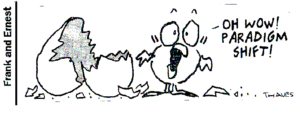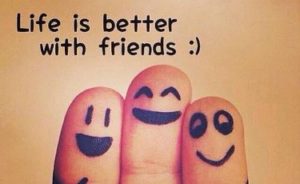We said our elected officials are out of touch, we need change. Our choice took office. The first month has not been pretty although it has solidified his opposition. His trustworthiness seems lost. How we move forward is probably less about him and more about us. We are a connected world. Almost everyone has a voice and has the tools needed to make their voice heard. Rather than assume we know what “they” want, ask. Rather than assume they know what we want, we should tell them.
When a new or different way of thinking or doing replaces the old way, it is a paradigm shift. The combination of devices, connectivity and easy to use applications created a new connected paradigm. Very recently that paradigm became pervasive (used by the vast majority). Having lived through numerous technology related paradigm shifts, I have learned that adapting to a new paradigm can be scary and can leave a scar. Yet, the reality of the new paradigm unfolds like it or not. Refusing to participate is not a real option. Connected with others is wonderful. I personally have more and better relationships than I would have without the connected paradigm.

However, when you ask what people think about this or that, they just might tell you. People are rarely just this or that. They are all sorts of in between. I asked what they thought and they responded. Most often I discovery that “they” are not a punch line or a caricature. We like many of the same things and disagree on some. Sometimes they do not care one way or the other about something for which you care deeply. They and I are we, and it turns out that we are human and complicated. We hold contradictory views. They like both opera and punk rock but I prefer 60’s bubblegum music. They fear what I do not, and vice versa.
I have spent my adult lifetime witnessing the series of information age paradigm shifts. All have been tough. People quit rather than learn the dreaded WordPerfect. Bosses were going to ban the use of e-mails because it seemed the only real purpose of email was to convey jokes between co-workers. A county board member wanted to ban the internet for every resident in the county because someone had looked up the value of his house on a web app I helped develop. One of my staff seriously asked, “If I am asked about my family, will I be fired for having a personal conversation on a company cell phone?”
So now, we need to work our way through this connected society paradigm shift. When you only saw your uncle, twice a year (my actual uncles are long dead), it was easy to ignore some of his beliefs. Now he is your Facebook friend and you frequently interact with him. Ignoring him is more difficult because he liked your joke, wished you well on your new job, and shared a tidbit about your grandma that put a tear of happiness in your eye. However, he also opposes that which you endorse. He likes some things you dislike. Besides, he is wrong about an issue that you understand.
- Do you keep him as a friend, taking the good with the bad?
- Do you un-friend him?
- Do you point out every point of disagreement?
- Do you hide what you believe from him?
- Do you ask him to post only of the things you agree with him about?
- Alternatively, do you accept that he is a complicated person and so are you?

Adapting to new paradigms really is tough. Feelings will be hurt. Relationships will strain. People will say something and later regret it. The socially acceptable answers work themselves out over time but in the meantime, we will say some stupid things. We need to make sharing ok and safe. We are not only learning proper etiquette but also trying to figure out what we believe about issues and life. If some friend changes position, that is not a bad thing even if they change it back again. It is recognizing that life is complicated.
If someone tells you something, be thankful. Respond about the thing, as appropriate, but (up to a limit) support the person.
Conclusion
In my experience, adapting to the paradigm shift itself is not the main problem people have. It is their fear that the paradigm shift will change their social, personal, professional relationships. I could never convince the secretary that Word Perfect was both learnable and that while she learned, we would all still think she was a valuable member of the team. The funny thing about this “connected” paradigm shift is that it is exactly about enhancing relationships. Relationships are great but rarely easy.
My advice. Do not expect that everyone agrees with you or that you will agree with everyone else. Let yourself participate in the discussion. Do not focus only on what you disagree with. Finding common ground is actually more fun. Not every post needs to be deep or profound. If it is nice outside, it is perfectly ok to say so. Do not tell secrets. There are no secrets on the internet.
Apologize often. Accept apologizes graciously. If you are worried about hurting someone’s feelings, do not post it. Be honest but not brutal. Your relationship is more important than an obscure point in a debate on Facebook. Let cooler heads prevail if it feels like thinks are heating up. Celebrate truth. Let most lies die from inattention. Questions often make a stronger statement than a statement does. Be helpful. Explain if you are misunderstood. Stand corrected if you were wrong.
